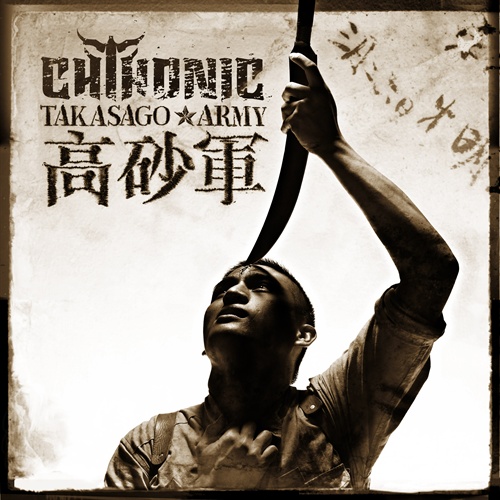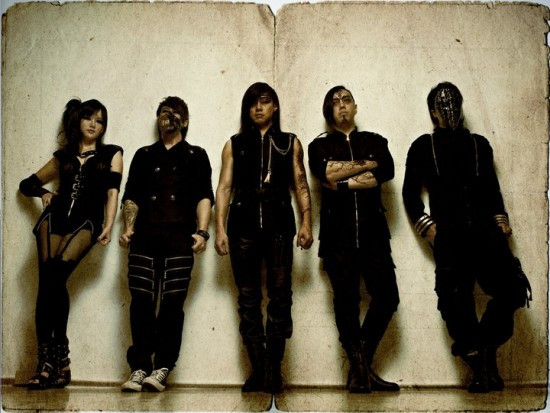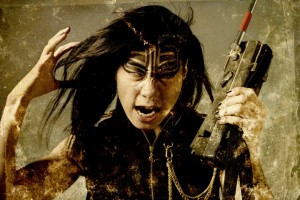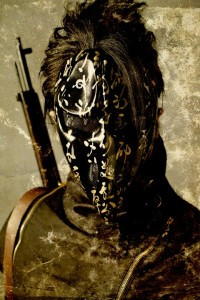
(The prolific Andy Synn is back with his third post this week. This time he’s reviewing the new album by Chthonic — Takasago Army.)
I love Chthonic. This is not something I am ashamed to admit. I have everything they have ever released with the exception of Where The Ancestor’s Souls Are Gathered. I did, however, find their last record, Mirror Of Retribution, a somewhat lacklustre affair – at least when compared with the two records that preceded it, 2002’s Relentless Recurrence and 2005’s Seediq Bale. The crisp, somewhat dry production robbed their sound of some of its individuality and subtlety, so that although the band performed with a new level of aggression and revitalised extremity, the songs overall were delivered with arguably less flair than on previous albums. That’s not to say there weren’t some great songs on the record. It’s still one I enjoy listening to, but I felt that the focus on more extreme, typically “metal” sounds was a mis-step (albeit a minor one) in the development of their unique sound.
So what does Takasago Army bring to the Chthonic sound? Does it successfully redress the balance of their culturally diverse, ethnic influences and vibrant extreme metallic fervour? Can it rejuvenate their passion for the embrace of their cultural heritage without limiting the totemic metal power they have spent so long building? Read on for the answer…

The lush opening instrumental of “The Island” is a positive sign, melding grand symphonic keys with Eastern instrumentation to great effect, conjuring an epic atmosphere of gorgeous ethnic overtones and subtle orchestral themes that serve to usher in the titanic opening chords of “Legacy Of The Seediq”. The guitar tone is utterly crushing, fusing effortlessly with the rampaging rhythmic attack of bass and drums working in perfect synchronicity. The keys and abstract instrumentation float ethereally around the sound, adding nuanced layers of depth and style, without diverting an ounce of intensity or attention from elsewhere. Yet the most obvious change that listeners will notice is in the vocals of singer Freddy Lim, who relies less on his traditional primal screech this time around, opting instead for a shockingly brutal array of guttural death growls which demonstrate some serious improvement in both his range and power.
 Seamlessly mixing driving heaviness with captivating melody, the album’s first single “Takao” captures a wealth of conflicting emotions which meld perfectly with the heavy subject matter of the song, dealing as it does with soldiers being driven off to war against their will. For those unaware, there are actually two versions of the song available, a traditionally Taiwanese version featuring the guest vocals of a popular Taiwanese singer, Yu Tien, and an alternative version which features members of Ensiferum bringing a rollicking Finnish folk sound to the track’s chorus refrain. Personally I prefer the former, but both versions have their charm!
Seamlessly mixing driving heaviness with captivating melody, the album’s first single “Takao” captures a wealth of conflicting emotions which meld perfectly with the heavy subject matter of the song, dealing as it does with soldiers being driven off to war against their will. For those unaware, there are actually two versions of the song available, a traditionally Taiwanese version featuring the guest vocals of a popular Taiwanese singer, Yu Tien, and an alternative version which features members of Ensiferum bringing a rollicking Finnish folk sound to the track’s chorus refrain. Personally I prefer the former, but both versions have their charm!
The band’s careful and well-researched grasp of the historical themes and emotive concepts behind this record are integral to its overall sound and execution. Addressing as it does the forcible induction and sacrifice of the Takasago Army, a unit of the Japanese Army taken from Taiwan during World War II, this record sees the band completely fired up, brimming with passion and righteous indignation, capturing the frustration and sense of violation which the abuse of the Taiwanese people has engendered, along with a palpable sense sorrow, loss and confusion.
 “Oceanquake” is amongst the heaviest numbers the band have ever recorded, due in large part to the pulse-quickening playing of drummer Dani Wang unloading salvo after salvo of ballistic kick drums which give the chugging guitars an extra shot of volatile heaviness, while also incorporating several intriguing layers of subtle, mournful Eastern melodies and grandiose symphonic accompaniments. Follow-up “Southern Cross” only continues this impressively heavy vibe, furthering the combustive furore through explosions of ferocious speed which leave the listener shell-shocked and vulnerable to some of the album’s best and most fiery riffage.
“Oceanquake” is amongst the heaviest numbers the band have ever recorded, due in large part to the pulse-quickening playing of drummer Dani Wang unloading salvo after salvo of ballistic kick drums which give the chugging guitars an extra shot of volatile heaviness, while also incorporating several intriguing layers of subtle, mournful Eastern melodies and grandiose symphonic accompaniments. Follow-up “Southern Cross” only continues this impressively heavy vibe, furthering the combustive furore through explosions of ferocious speed which leave the listener shell-shocked and vulnerable to some of the album’s best and most fiery riffage.
The two longest songs on record, “Kaoru” and “Broken Jade”, pack a huge amount of variety into their extended run time; the former a blistering exercise in unrelenting velocity and impressive stamina, with a cutting guitar tone and tenacious, blast-friendly drumming performance balanced by excursions into majestic post-Emperor symphonics and soaring female vocals, the latter a controlled piece of calculated devastation which explores a dynamic range of rhythms and speeds, bristling with righteous anger and a sense of desolation which is only heightened by the majestic, mournful keyboard and string arrangements. Throughout both tracks, Freddy Lim’s wounded screams and throat-tearing growls resonate with sincerity and passion, the clear personal relevance of the album’s themes bringing from him a performance of utterly convincing passion and power.
 After the meditative interlude of “Root Regeneration”, which provides a necessary break and contrast from the tumultuous riff storm of the rest of the record, “Mahakala” plays off teasing snatches of esoteric oriental melody against chugging metallic power, Dani Wang’s taut snare drum cutting through the mix with shocking clarity, controlling and conducting the complicated interplay of traditional and non-traditional metallic elements with care and tactical precision, allowing the many-layered strains of plaintive lead guitar and oriental strings to merge organically as one.
After the meditative interlude of “Root Regeneration”, which provides a necessary break and contrast from the tumultuous riff storm of the rest of the record, “Mahakala” plays off teasing snatches of esoteric oriental melody against chugging metallic power, Dani Wang’s taut snare drum cutting through the mix with shocking clarity, controlling and conducting the complicated interplay of traditional and non-traditional metallic elements with care and tactical precision, allowing the many-layered strains of plaintive lead guitar and oriental strings to merge organically as one.
Closer “Quell The Souls In Sing-Ling Temple” begins with a steady, martial stomp, demonstrating admirable restraint and a subdued fury that serves to build the tension to breaking point, before eventually rupturing under the sheer pressure of attempting to contain the rabid vocals and frenetic guitars for so long. The song’s mid-section willingly embraces a dreamy, contemplative blend of ethnic orchestration and shimmering keys, which allows the listener a chance to reflect and ruminate on the heady array of musical themes of the record, spanning as they do the whole gamut of the emotional spectrum. The finale of the song is an eruption of rapid-fire riffs and gale-force drums, crowned with a spiky, electrifying solo and a series of stratospheric leads, and the primal, vehement vocal exhortations of vocalist Freddy Lim which end the album on a stunning high note.
This record re-captures and builds upon the new-found aggression the band displayed on Mirror Of Retribution, but welds it far more organically onto a more impressively complex and instrumentally diverse core of armour-plated Oriental metal, which embellishes an impressive concoction of Western black and melodic death metal elements with a compelling mixture of culturally distinctive and diverse sounds and melodies.
 It’s difficult to praise any one member over another on this album, the group clearly acting as a singular unit; the vocals are more vibrant and aggressive than ever before, the at-times demon-possessed Freddy Lim delivering a career-defining performance which bleeds emotion from start to finish, while the blitzkrieg drums pummel with renewed ferocity and vigour – Dani Wang’s crushing display of calculated power and seemingly endless stamina pushing the group along at maximum speed and with devastating force yet also adding backbone to the group’s various melodic or symphonic digressions which allows them to retain their overall punishing extremity.
It’s difficult to praise any one member over another on this album, the group clearly acting as a singular unit; the vocals are more vibrant and aggressive than ever before, the at-times demon-possessed Freddy Lim delivering a career-defining performance which bleeds emotion from start to finish, while the blitzkrieg drums pummel with renewed ferocity and vigour – Dani Wang’s crushing display of calculated power and seemingly endless stamina pushing the group along at maximum speed and with devastating force yet also adding backbone to the group’s various melodic or symphonic digressions which allows them to retain their overall punishing extremity.
Neither of these elements would work without the thick foundations of thrumming bass laid down by Doris Yeh, or indeed the plethora of scything riffs and lightning leads provided by guitarist Jesse Liu – whose refined knack for sharing the ebb and flow of the lead instrument role is equally adept at conjuring massive, dominating riffs and nimble solos as composing beautifully layered chord progressions and flowing note cascades to support the other elements of the band’s expansive sound. The man’s playing, so often under-appreciated and overshadowed by the band’s greater identity, is a joy to absorb throughout this record.
 Of course, no Chthonic record would be complete without the multifarious instrumental embellishments provided by keyboardist Cj, who brings his stylish symphonic overtones full strength to this record, ably abetted in this by the weeping melodies of the Erhu, whose continued presence and prominence in the Chthonic “sound” helps make them an instantly recognisable musical entity. In a manner similar to other ethnically focussed black metal acts (Rotting Christ, Primordial, Melechesh, etc), the group have embraced their cultural identity through the use of Oriental melodies and modes, incorporating and exploiting the distinctive styles and instrumentation of their homeland – not to cover or distract from any weaknesses in their sound but to enhance the distinctive style and deeper musical identity that defines their music more fully as “Orient Metal”, a sound totally their own which draws comprehensively from multiple metallic and musical traditions.
Of course, no Chthonic record would be complete without the multifarious instrumental embellishments provided by keyboardist Cj, who brings his stylish symphonic overtones full strength to this record, ably abetted in this by the weeping melodies of the Erhu, whose continued presence and prominence in the Chthonic “sound” helps make them an instantly recognisable musical entity. In a manner similar to other ethnically focussed black metal acts (Rotting Christ, Primordial, Melechesh, etc), the group have embraced their cultural identity through the use of Oriental melodies and modes, incorporating and exploiting the distinctive styles and instrumentation of their homeland – not to cover or distract from any weaknesses in their sound but to enhance the distinctive style and deeper musical identity that defines their music more fully as “Orient Metal”, a sound totally their own which draws comprehensively from multiple metallic and musical traditions.
It might take a while to say for certain, but this could well be amongst the best records Chthonic has ever put out. The material is consistently strong and fundamentally evocative of deep-seated historical and cultural themes, while each member seems to be playing at their very best, with particular praise going to the increased ferocity and drastically improved skills demonstrated by vocalist Freddy Lim, guitarist Jesse Liu and drummer Dani Wang. From start to finish the sheer unity of the structures, performances and (suitably massive) production helps to perfectly capture the intrinsic ire and anguish that drives the band’s metallic form of cultural expression and protest.
EDITOR’S NOTE: Takasago Army will be released later this month by Spinefarm Records. Earlier this week, Chthonic released their second music video based on the album (we previously featured the superb first video here). Here’s the new video, for “Broken Jade”:

Wasn’t too impressed with the start of that song, but as they progressed they pulled me in more and more. Love the use of that Japanese violin thingy. Quality touch!
Isn’t it Taiwanese???
I think that’s the erhu that Andy mentioned, a Chinese “violin”:
http://en.wikipedia.org/wiki/Erhu
I am not certain of its original provenance.
Calling it an “Oriental” violin seems to work for me so far!
I think this album might go on my very tiny automatic buy list.
Funny, yesterday, while listening to that song from the earlier post, i thought to myself: when can i get my hands on this new album. Now, after reading this and listening to that song i’m just too anxious, it’s tormenting. Kudos to Andy for, yet again, a great review. At first, it’s not really an easy read for a non-native English-speaker, but well worth the effort to push through.
Hey, it’s not easy for a native English speaker either!
(Joking, Andy, just joking . . .)
Like I said, I feel that the cultural relevance and historical background of the record informs the passion and fire of their delivery. And I think this sums up a lot of the story and background to the music…
https://www.facebook.com/note.php?note_id=10150202621017190
(stolen from a comment on TheNumberOfTheBlog)
oh and thanks alot for the link man, i knew their music had a very deep historical and cultural meaning, but after reading the full story i feel sort of enlightened.
i love the sound of the erhu, it reminds me so much of old samurai/ninja movies for some reason.
cant wait to hear the rest of the album.
One thing I can’t work out yet, is how the two versions of “Takao” are being split by market? Since I really would rather have the more Taiwanese version (not really an Ensiferum fan at all) would I have to order it from the Far East?
Things to consider… let me know if anyone has any insight!
I did some hunting, and the best I found was this, which indicates that Spinefarm was going to release Takao (the original, with Tien’s vocals) as a digital track with the Ensiferum-vocal version as a bonus track on the single. I’m guessing that was to be a European single release, because it sure isn’t available in the US on iTunes or Amazon.
http://chthonic.org/2009/us/news.html
For several years now I’ve been completely unable to see what anyone saw in Chthonic. So after reading such a glowing review I checked out a few tracks on youtube (including the linked one). And honestly…I think my opinion’s changed. These tracks are pulling me in like nothing else I’ve heard of theirs. I don’t know if I’ve misjudged them in the past or if this album really is head and shoulders over everything else they’ve done, but they definitely deserve another look.
Huzzah!
I actually had a very similar reaction. I listened to their music a few years ago and just couldn’t get into it, but the tracks I’ve heard from this album so far have really hooked me. I’m looking forward to hearing all of it.
I’m gonna have to say the same thing!!!
But I do think the music is a lot different now. Or at least different enough.
After the first single (Takao), I went online to look for some more of their music, but it didn’t do anything for me.. They’re doing something different with this album. I wish I were smart enough to know what it is…
Haha, my opinion differs from y’all. While I think this album has its merits, I think Chthonic’s older albums (excluding the pretty horrible “Mirror Of Retribution”) sounded more oriental and haunting than the latest one. For my reasons as to why I think so, check out: http://www.popmatters.com/pm/review/146132-chthonic-takasago-army
Maybe it’s because I am Asian and I have very high expectations of metal bands from my own region getting signed onto big labels. By the way, I think Demonic Resurrection (from India and signed onto Candlelight) is pretty bad.
EXCELENTE!!! ESE ES EL PODER OIRIENTAL!